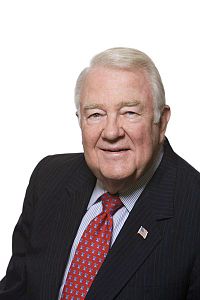Edwin Meese: Difference between revisions
George Swan (talk | contribs) (first draft) |
George Swan (talk | contribs) (add image) |
||
| Line 2: | Line 2: | ||
{{Infobox Person | {{Infobox Person | ||
| name = Edwin Meese | | name = Edwin Meese | ||
| | | portrait = Edwin Meese publicity shot.jpg | ||
| alt = | | alt = | ||
| caption = | | caption = | ||
Revision as of 01:10, 19 December 2022
| Edwin Meese | |
|---|---|

| |
| Occupation | politician |
| Known for | played a role in trading arms for hostages in the Iran-Contra scandal |
Edwin Meese is an American politician. He has been a long time member of the Republican Party.
He worked under Governor of California Ronald Reagan, from 1967 to 1974, in various senior positions, including as his chief of staff.[1] In 1980 Meese joined the Reagan Presidential Campaign, again as chief of staff. Meese headed Reagan's transition team.[2]
Meese served as a counselor to Reagan, and sat on both his Presidential cabinet and the National Security Council, from 1981 to 1985. Meese played a leadership role in the development of Reagan's Strategic Defense Initiative.
Reagan appointed Meese the successor to U.S. Attorney General William French Smith when he began his second term.[3][4] Senate confirmation of his appointment was contentious. Archibald Cox, on behalf of the lobby group Common Cause, alleged the record showed Meese had shown favoritism to financial backers, enabling them to subsequently assume positions in the first Reagan administration. The Senate confirmed his appointment on February 24, 1985.[5]
In 1989 testified before Congress that he had been concerned that Reagan might face impeachment over the Iran-Contra deal.[6]
In March of 1989, Meese was called as a witness, by the prosecution, in the trial of former Reagan aide Oliver North.[7] North was on trial for the illegal shredding of documents, and Meese confirmed the fears within the senior elements of the Reagan administration that Reagan was at risk of being impeached.[8]
References
- ↑ Lou Cannon (2005). Governor Reagan: His Rise to Power. PublicAffairs, 592. ISBN 9781586482848. Retrieved on 2022-12-17.
- ↑ Richard Wirthlin, Wynton C. Hall (2004). The Greatest Communicator: What Ronald Reagan Taught Me About Politics. John Wiley & Sons. ISBN 9780471736486. Retrieved on 2022-12-17.
- ↑ CQ Almanac Online Edition. Retrieved on 2021-01-23. -->
- ↑ Leslie Maitland Warner. Common Cause Bids Senate Vote against Meese, The New York Times, 1984-12-19, p. A19. Retrieved on 2021-01-23. “The independent counsel's investigation focused on allegations that Mr. Meese had helped arrange positions in the Reagan Administration for individuals who had assisted him financially and that he had failed to disclose, as required by law, a $15,000 interest-free loan to his wife.” -->
- ↑ Leslie Maitland Warner. Senate Approves Meese to Become Attorney General, The New York Times, 1985-02-24.
- ↑ Texan Acts for Impeachment, The New York Times, 1987-03-06, p. 18.
- ↑ David Johnston. Meese Testifies That Impeachment Was a Worry, The New York Times, 1989-03-29, p. 17. “Mr. Meese was not asked today to explain precisely what actions he feared might constitute an impeachable offense. Mr. Meese said Mr. Reagan did not know of the diversion before his brief inquiry. But the documentary record that might confirm that account is incomplete because of the shredding of documents by Mr. North and others. 'That Spelled Touble'.” mirror
- ↑ The True Oliver North Outrage, The New York Times, 1991-05-30, p. A24. Retrieved on 2022-12-17. “Mr. North's silence posed a dilemma. Congress and the public demanded rapid exposure of what might turn out to be impeachable conduct. But forcing Mr. North and others to testify, even under court-ordered immunity, might complicate any attempt to prosecute him.”